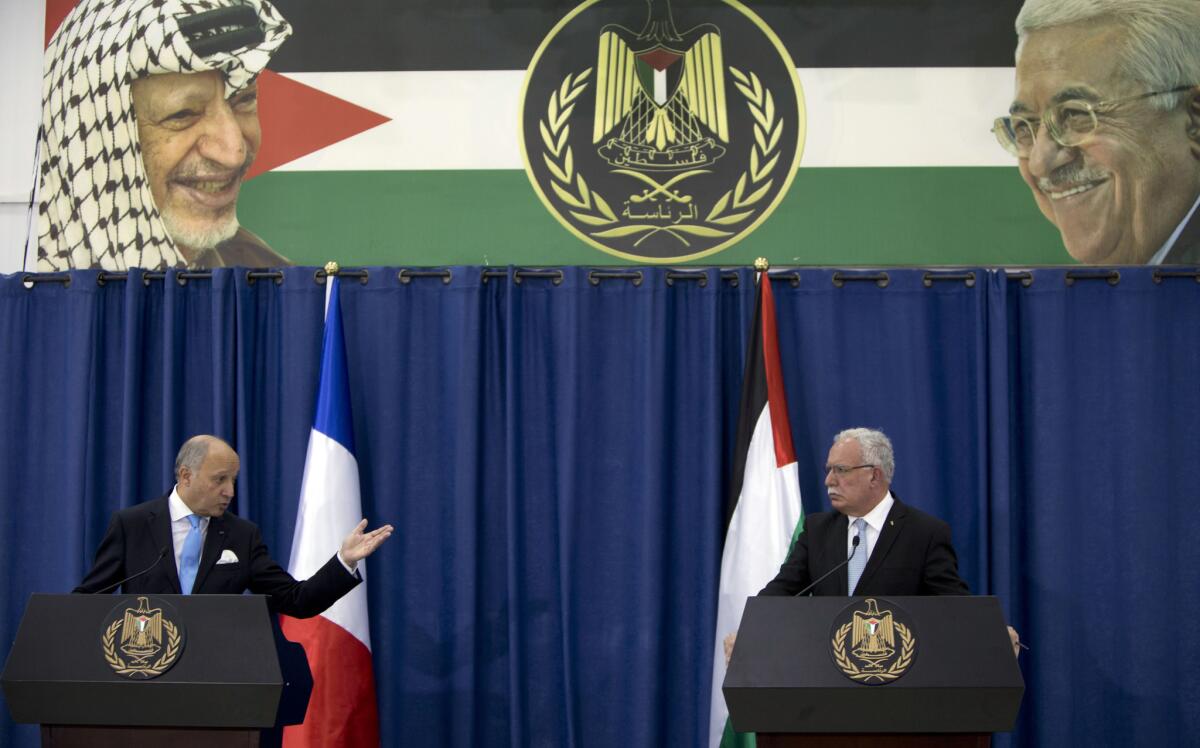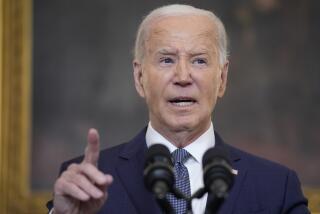A new chance for Mideast peace? French foreign minister has a plan

French Foreign Minister Laurent Fabius, left, speaks Sunday during a press conference with Palestinian Foreign Minister Riyad Maliki in the West Bank city of Ramallah.
- Share via
Reporting from Jerusalem — French Foreign Minister Laurent Fabius held meetings in Jerusalem and the West Bank on Sunday to explain the outlines of a possible proposal to the United Nations to restart peace negotiations.
France is reportedly drafting a resolution that would set an 18-month timetable for Israelis and Palestinians to agree on a two-state solution. It would call for recognition of Palestinian statehood if the talks do not bear fruit.
Israel rejects the move as an external dictate to impose a solution that does not meet its security needs. At the beginning of a meeting with Fabius in Jerusalem, Israeli Prime Minister Benjamin Netanyahu said that peace would only come from direct negotiations with no preconditions. “It will not come from U.N. resolutions that are sought to be imposed from the outside,” he said.
Netanyahu described what he called the “twin foundations” of an agreement over a demilitarized Palestinian state: Palestinian recognition of Israel as the national homeland of the Jews and “iron-clad security arrangements.” He also said the Palestinian leadership has systematically run from negotiations with Israel.
“I think there is no magic shortcut,” Netanyahu said, adding that peace requires a sustained effort. “I am ready for such an effort,” he added.
In an earlier meeting with Israeli President Reuven Rivlin, Fabius said his visit aimed to “bring together all the threads once again, and return to negotiations,” with concern for Israel’s safety. Rivlin expressed concern that the Palestinians were trying to “transfer the conflict to the U.N.”
Fabius, however, said there was no interest in proposing resolutions to the Security Council if they were “bound to fail or be vetoed” and called for a general agreement.
An effort by Fabius’ U.S. counterpart, Secretary of State John Kerry, to broker Mideast peace talks collapsed last year in a spiral of tensions that led to the war in Gaza between Israel and Hamas.
Fabius also met Sunday with Palestinian Authority President Mahmoud Abbas in Ramallah and later held a joint press conference with his Palestinian counterpart, Foreign Minister Riyad Malki.
Explaining that he came to present the French ideas to both sides, Fabius expressed understanding of both sides’ needs.
“We want to give security to Israel and at the same time give the Palestinians their right to establish their independent state,” he said. The minister also cautioned that failure to achieve a solution would have “negative repercussions, more violence and terror.”
Fabius said his country wishes to see an “international presence in the negotiations,” especially in their final stages. While there is a need for a Security Council decision, he said, “it is not a goal in itself.”
Without going into details about the outline of the French proposal, Malki said Abbas told Fabius there was “harmony between the Palestinian and French ideas” and expressed commitment to an outline that could revive the peace process.
It was not immediately clear when France intends to submit the resolution, although recent reports suggested it could be sometime after the Western powers conclude a nuclear agreement with Iran, set for the end of the month.
In Jerusalem, Fabius stressed his country’s strong stand against any possibility of Iran gaining a nuclear weapon, and said France currently saw “no progress” in the talks. “Of course we want to reach an agreement but an agreement has to be firm, and we must be sure that we can check this at any moment,” he told Rivlin.
Netanyahu urged France to “stand firm and prevent a bad deal that will pave Iran’s path to the bomb.”
Sobelman is a special correspondent. Special correspondent Maher Abukhater in Ramallah contributed to this report.
More to Read
Sign up for Essential California
The most important California stories and recommendations in your inbox every morning.
You may occasionally receive promotional content from the Los Angeles Times.










